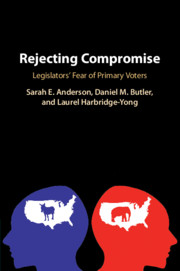Book contents
- Rejecting Compromise
- Rejecting Compromise
- Copyright page
- Contents
- Figures
- Tables
- Acknowledgments
- 1 Rejecting Compromise, Getting Gridlock
- 2 Legislators Reject Half-Loaf Compromises
- 3 Legislators Reject Half-Loaf Compromises Because They Fear Voter Retribution
- 4 Primary Voters as the Source of Punishment
- 5 Voter Punishment Is Rare but Real
- 6 Structuring Negotiations in the Shadow of Primary Voter Punishment
- 7 Compromise, Voter Punishment in Primaries, and Legislative Gridlock
- References
- Index
1 - Rejecting Compromise, Getting Gridlock
Published online by Cambridge University Press: 28 January 2020
- Rejecting Compromise
- Rejecting Compromise
- Copyright page
- Contents
- Figures
- Tables
- Acknowledgments
- 1 Rejecting Compromise, Getting Gridlock
- 2 Legislators Reject Half-Loaf Compromises
- 3 Legislators Reject Half-Loaf Compromises Because They Fear Voter Retribution
- 4 Primary Voters as the Source of Punishment
- 5 Voter Punishment Is Rare but Real
- 6 Structuring Negotiations in the Shadow of Primary Voter Punishment
- 7 Compromise, Voter Punishment in Primaries, and Legislative Gridlock
- References
- Index
Summary
This chapter illustrates how legislators sometimes reject compromise proposals with an example of legislation on public lands management in Utah. Despite broad support for the bill, which was viewed as a compromise solution to increase protection for the San Rafael Swell area, it had detractors who felt it did not go far enough. The failure of the San Rafael Swell National Conservation Area legislation shows that legislators sometimes reject half-loaf compromises in pursuit of getting everything they want. This book takes a problem-oriented approach by examining why legislators reject half-loaf compromises and what can be done about it. This chapter summarizes the varied methods we used to understand the rejection of compromise, our findings that legislators fear punishment for compromise from subsets of the primary election who oppose particular compromises, and our contributions to solving this problem
Keywords
- Type
- Chapter
- Information
- Rejecting CompromiseLegislators' Fear of Primary Voters, pp. 1 - 14Publisher: Cambridge University PressPrint publication year: 2020

